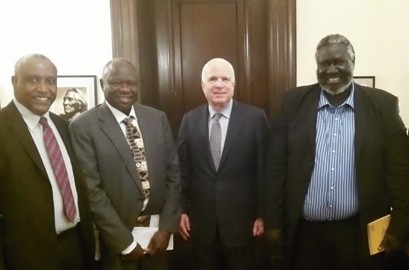SPLM-N calls on Washington to link normalization with peace in Sudan
August 24, 2015 (KHARTOUM) – The Sudan People’s Liberation Movement – North (SPLM-N) called on the U.S. administration to not normalize bilateral relations with Sudanese government before peace and genuine democratic reform.

Since 2004, Washington has always t linked further progress on normalization of bilateral ties to the situation in Darfur region and since 2011 to the situation in South Kordofan and Blue Nile states.
The SPLM-N urged the American administration to maintain its stance and to make it clear for the Sudanese officials that normalization process is linked to a comprehensive peace agreement ending the armed conflicts, and democratic reforms.
“We appeal and ask the United States’ Administration and Special Envoy to take a clear stand and to send a clear message to the Sudan government and the Sudanese people that it is time for change, that a peaceful settlement and reconciliation are needed, and that there will be no normalization unless basic human rights are respected and the rights of people to change is guaranteed,” said the SPLM-N secretary general Yasir Arman in a statement issued on Monday.
The rebel group which participated in a two-day meeting with the African Union High Level Implementation Panel (AUHIP) pointed that Sudanese president Omer al-Bashir “disregarded the great effort” by the African mediators and the road-map to facilitate the national dialogue endorsed by the Peace and Security Council of the African Union and the UN Security Council.
Sudanese officials refuse the American conditions and called a new approach based on the interests of the two countries. They also point to the anti-terrorism cooperation and the independence of South Sudan.
However, Khartoum said that Washington can contribute to bring peace in Sudan once the two countries have re-established good relations.
Last February following the visit of the then presidential assistant, the State Department said that discussions with Ibrahim Ghandour “included ways to advance a more frequent and substantive exchange about our respective interests and concerns in the region, including ways to achieve a sustainable peace in Sudan”.
(ST)
